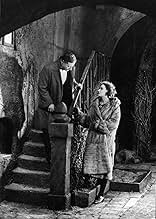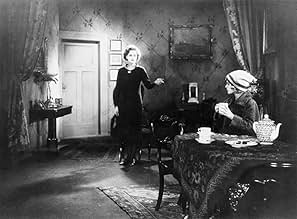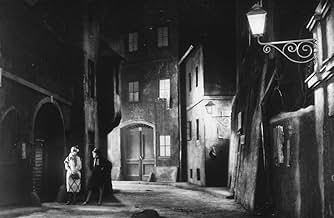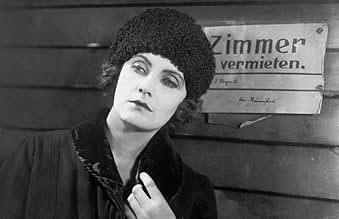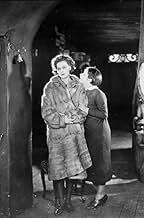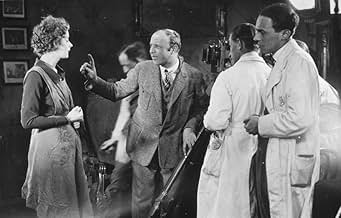IMDb RATING
7.0/10
1.8K
YOUR RATING
In post-WWI Vienna, Greta (Greta Garbo), her kid sister, and retired dad try to make it through tough times.In post-WWI Vienna, Greta (Greta Garbo), her kid sister, and retired dad try to make it through tough times.In post-WWI Vienna, Greta (Greta Garbo), her kid sister, and retired dad try to make it through tough times.
- Director
- Writers
- Stars
Ágnes Eszterházy
- Regina Rosenow
- (as Agnes Esterhazy)
Dorothea Thiele
- Lia Leid
- (as Tamara)
Renate Brausewetter
- Frau
- (uncredited)
Mario Cusmich
- Oberst Irving
- (uncredited)
Maria Forescu
- Frau
- (uncredited)
Robert Garrison
- Don Alfonso Canez
- (uncredited)
Valeska Gert
- Frau Greifer
- (uncredited)
Max Kohlhase
- Marias Vater
- (uncredited)
Krafft-Raschig
- Amerikanische Soldat
- (uncredited)
- Director
- Writers
- All cast & crew
- Production, box office & more at IMDbPro
Featured reviews
For a long time "Die freudlose gasse" was not available in his "directors cut" form because all too explicit brothel scenes were deleted by censors. Only in 1997 a reconstruction took place. I saw the "full version". It is a good movie but above all the movie has special interest from the perspective of film history.
"Die freudlose gasse" forms a transition between the German expressionism and "die neue sachlichkeit / new objectivity". The skewed set pieces in the entrance to the nightclub of Frau Greifer reminds of German expressionism but the subject of the film is 100% new objectivity. No psychological themes such as in for example "Das Cabinet des Dr Caligari" (1920, Robert Wiene) but social engagement with the (very) poor in Vienna after the hyperinflation.
Some films emphasize the fate of the poor, for example "The grapes of wrath" (1940, John Ford). Some films emphasize the ruthlessness of the rich, for example "Wallstreet" (1987, Oliver Stone). In "Die freudlose gasse" Pabst emphasizes the contradiction between the rich and the poor. He does so by intelligent editing, and in so doing brings the theory of associative editing of Sergeij Eisenstein to the West.
There is not only a contradiction between rich and poor, but also a contradiction between poor and impoverished. After all this film is not situated after the stock market crash of 1929 but after the hyperinflation caused by (the piece treaty of) the First World War. This hyperinflation could make members of the middle class poor in only a few hours. Maria (played by Asta Nielsen) is a daughter of a poor family. Greta (played by Greta Garbo) is daughter of an impoverished family. Maria ends badly, Greta escapes the misery. Symbolically two big stars of Scandinavian cinema pass on the relay baton in this movie.
The most striking character of this film is however not played by either Asta Nielsen or Greta Garbo but by Valeska Gert as Frau Greifer. Her character is a sort of female Mephistopheles. She is both tailor and owner of a nightclub. As a tailor she sells expensive coats on credit. As the owner of the nightclub she coerces young girls to perform when they could not pay their debts.
"Die freudlose gasse" forms a transition between the German expressionism and "die neue sachlichkeit / new objectivity". The skewed set pieces in the entrance to the nightclub of Frau Greifer reminds of German expressionism but the subject of the film is 100% new objectivity. No psychological themes such as in for example "Das Cabinet des Dr Caligari" (1920, Robert Wiene) but social engagement with the (very) poor in Vienna after the hyperinflation.
Some films emphasize the fate of the poor, for example "The grapes of wrath" (1940, John Ford). Some films emphasize the ruthlessness of the rich, for example "Wallstreet" (1987, Oliver Stone). In "Die freudlose gasse" Pabst emphasizes the contradiction between the rich and the poor. He does so by intelligent editing, and in so doing brings the theory of associative editing of Sergeij Eisenstein to the West.
There is not only a contradiction between rich and poor, but also a contradiction between poor and impoverished. After all this film is not situated after the stock market crash of 1929 but after the hyperinflation caused by (the piece treaty of) the First World War. This hyperinflation could make members of the middle class poor in only a few hours. Maria (played by Asta Nielsen) is a daughter of a poor family. Greta (played by Greta Garbo) is daughter of an impoverished family. Maria ends badly, Greta escapes the misery. Symbolically two big stars of Scandinavian cinema pass on the relay baton in this movie.
The most striking character of this film is however not played by either Asta Nielsen or Greta Garbo but by Valeska Gert as Frau Greifer. Her character is a sort of female Mephistopheles. She is both tailor and owner of a nightclub. As a tailor she sells expensive coats on credit. As the owner of the nightclub she coerces young girls to perform when they could not pay their debts.
'Joyless' is right; this brooding, silent melodrama, set in the economic shambles of post-World War I Austria, looks as if it were filmed entirely at night. Working on the same principle as a soap opera, it's an exaggerated dramatic recreation of life in hard times, when housewives were forced to sell themselves to pay for their family's next meal, while the last remnants of the aristocracy blithely danced the evenings away and worked their spurious financial schemes, ignorant of the poverty surrounding them. The complicated plot involves jealousy, murder, seduction, and Greta Garbo, looking older and wiser than any twenty year old has a right to. The film was almost a warm-up for Pabst's equally debauched 'Pandora's Box', and was also known (for good reason) as 'Street of Sorrow'.
Note: I saw what was probably the truncated version, on Super-8 (!!) The fully restored film would likely rate even higher...
Note: I saw what was probably the truncated version, on Super-8 (!!) The fully restored film would likely rate even higher...
I saw what appeared to be sourced from a UK reissue print of this film that only ran about an hour. I could tell, however, from what what not edited out of this print in order to emphasise the presence of Greta Garbo that it could not have been lightly that the decision was taken to distribute this film as "Joyless Street." It's relentlessly a relentlessly dispiriting tale of the poorer class being driven to misery, suffering, and humiliation at the whims of the rich. A theme like that can easily have a lot of political resonances, but "Joyless Street" prefers to take a more microcosmic tack and focus on the sorrows of one family and the events that lead to them.
It's a very well-made film; the filming, as might be expected, is highly atmospheric, and certain shots -- especially the roving camera down the line outside the butcher's -- are exquisite. It can't be said that Greta Garbo doesn't deserve the attention lavished on her by this edited print; she is absolutely magnetic. I haven't seen many with her kind of presence.
The addition of a serendipitous love story involving an American somehow doesn't cheer the film up significantly and seems a bit jarring and contrived.
It's a very well-made film; the filming, as might be expected, is highly atmospheric, and certain shots -- especially the roving camera down the line outside the butcher's -- are exquisite. It can't be said that Greta Garbo doesn't deserve the attention lavished on her by this edited print; she is absolutely magnetic. I haven't seen many with her kind of presence.
The addition of a serendipitous love story involving an American somehow doesn't cheer the film up significantly and seems a bit jarring and contrived.
In the post-WW1 in Vienna, a group of millionaires decide to manipulate the stock market with rumors to make it fall in the first moment and raise when people discover the truth. The ambitious Egon Stirner (Henry Stuart) loves Regina Rosenow (Agnes Esterhazy), who is the daughter of a wealthy man and she does not believe in his feelings. Egon has a love affair with Lia Leid, who is the wife of the wealthy Dr. Leid, and he asks if she may borrow some money to him to invest in the stock market. Meanwhile the secretary Marie (Asta Nielsen) has an unrequited love for Egon and decides to ask for a loan to Mrs. Greifer, who is the owner of a brothel in the poor Melchior Street, to give to Egon. The wealthy Don Alfonso Canez offers the amount to Marie and she goes to a room with him. When Lia is mysteriously murdered in a room in the same hotel, Marie falsely accuses Egon of killing her to Canez.
Meanwhile, the bureaucrat Hofrat Rumfort (Jaro Fürth) is not aware of the manipulation of the market and believes that is rich with the fall of the stocks and he spends a great amount. His daughter Greta (Greta Garbo) loses her job and they are forced to rent a room in their apartment to the Red Cross Lieutenant Davis (Einar Hanson) that pays a large amount to her. However she is forced use the money to pay the debts of her father. The only way to make money to feed the family is prostitution in Mrs. Greifer's brothel. What will be the fate of Greta?
"The Joyless Street" is a complex and melancholic story of a depressive period of history. The work of Georg Wilhelm Pabst is amazing since he is able to present a long feature (the edited version of 125 minutes running time) with many sub-plots and characters. This movie is also one of her first work of the gorgeous Greta Garbo that has a top-notch performance. My vote is eight.
Title (Brazil): "Rua das Lágrimas" ("Street of the Tears")
Meanwhile, the bureaucrat Hofrat Rumfort (Jaro Fürth) is not aware of the manipulation of the market and believes that is rich with the fall of the stocks and he spends a great amount. His daughter Greta (Greta Garbo) loses her job and they are forced to rent a room in their apartment to the Red Cross Lieutenant Davis (Einar Hanson) that pays a large amount to her. However she is forced use the money to pay the debts of her father. The only way to make money to feed the family is prostitution in Mrs. Greifer's brothel. What will be the fate of Greta?
"The Joyless Street" is a complex and melancholic story of a depressive period of history. The work of Georg Wilhelm Pabst is amazing since he is able to present a long feature (the edited version of 125 minutes running time) with many sub-plots and characters. This movie is also one of her first work of the gorgeous Greta Garbo that has a top-notch performance. My vote is eight.
Title (Brazil): "Rua das Lágrimas" ("Street of the Tears")
Significant movies have usually been associated with eminent directors or cast. That was also the case of the earliest nitrate silent movies, including the European cinema of that time. However, the movie that appeared to be a true phenomenon, a screen production that talked about people in unbelievable power, a silent recognized by many as the border between German Expressionism and new realism was THE JOYLESS STREET by Georg Wilhelm Pabst. Along with F.W. Murnau who became popular thanks to his thrilling NOSFERATU and innovative LAST LAUGH, Pabst became a highly respected director thanks to the controversial THE JOYLESS STREET. He proved to be a director who could create something thought provoking and ambiguous, who could surely enjoy appreciation among modern ambitious viewers. At that time, however, the movie's power occurred barely legal, which resulted in chopping it up, mutilating it and censoring it. Consequently, THE JOYLESS STREET became the most censored film of the Weimar Republic.
Years have passed emerging in various versions in multiple countries (for instance, the widely known Kino print missed four reels). Gaps have occurred more serious, which, however, did not stop various attempts to restore the film supplying it, at least partly, with the 'lost' glamor (Munich Filmmuseum restorations: the 1989 Patalas works and the 1995 'Project Lumiere' efforts). One of the thoughts accompanied their successful attempts: 'a thought provoking movie' by a great master that Pabst was will also find its audience nowadays.
In the times of computers and action movies, someone may ask: 'What is it that makes THE JOYLESS STREET worth being called 'thought provoking'? Now, Pabst's movie is, on the one hand, a historical glimpse of social classes in the post War I Vienna (homeless "Lumpenproletariat", working class, destitute middle class, and nouveau riche upper middle class); on the other hand, a unique insight into the psyches of individuals within the social misery. Rather than a tear jerking drama, this is the perfect exploration of despair, difficult decisions, determination contrasted with the manipulative upper classes, who spread false rumors that destroy the poor but rouse the wealthy. This is, in other words, the depiction of the joyous life in wealth and speculations clashing with the joyless life in poverty and distress...that is what emerges from THE JOYLESS STREET (consider the source novel by Hugo Bettauer murdered in 1925).
Indeed, it is something that builds an unforgettable experience that does not allow anyone remain indifferent. However, in spite of its universal nature and a very provocative content, the movie was almost on the verge of negligence and still remains highly mutilated, condensed, subjective. Why is it so bound to be distorted? In most cases, the reason appears to be the aforementioned censorship. Paradoxically, however, this subjectivity appears to be caused by one name, a great star who makes its title remembered.
That is Greta Garbo, without doubt, one of the greatest charisma of cinema. The title in her filmography is bound to be treated solely as a Garbo film. Yet, THE JOYLESS STREET is not at all a sort of film like many of her MGM vehicles. This is, along with GOSTA BERLING SAGA directed by her Swedish mentor Mauritz Stiller, a beautiful exemplification of Garbo's exceptional talent still uninfluenced by Hollywood. It is here we encounter the young Greta Garbo (19 years old at the time) who is not in the lead, not a great queen of MGM, who is not a vamp, a seductress nor a symbol, but a poor young girl, one of many in a queue for meat within the sorrows of the joyless street. Thanks to many of her scenes, we find out that Garbo acquired this unique 'magic' of hers already in Europe, at the side of great directors and great European cast (THE JOYLES STREET also casts Asta Nielsen, Werner Kraus, and Hertha Von Walter). Much is born here, much that we find elsewhere: her overwhelming gestures, her unique contact with the camera, her face that alone speaks to us more clearly than inter-titles (beside the strange make-up that one can surely get used to in the long run). Although her role of Greta in THE JOYLESS STREET is a secondary role, she seems to take over our attention. But here, let me highlight some aspects of Garbo's role and performance in a more detailed manner.
Garbo's job is very difficult; yet, she crafts it with extraordinary flair and profound insight into determination and dignity. It is clear that she truly identifies with the character she plays. There are some moments, particularly near the end, where her face expresses a chain of different feelings from angst, despair, fear to relief and joy. The role is something that addresses her personality more than seductive vamps or women in love with diamonds. Perhaps, that is why she does not need much experience yet portrays the character so genuinely and memorably. But, unfortunately, many do not understand that interesting fact. Nevertheless, Garbo's impact on the film's success is so strong that there is no doubt THE JOYLESS STREET has been solely considered a Garbo movie since 1925. That September (1925), Garbo arrived in the USA with her mentor director Mauritz Stiller and became the supreme artist. Yet,...
nowadays, when we view THE JOYLESS STREET, we should keep in mind that it is much more than Garbo's masterful acting. It is an exception in the history of cinema due to its highly psychological content, border of expressionist - realist atmosphere, its 'political incorrectness' and innovations galore; yet, also its strange fate of various versions, different attempts of preservation and the widespread subjectivity. Although it was on the verge of negligence, there are, fortunately, people who appreciate the great potential of this film. It is a pity that so few movie buffs have seen this film, but, perhaps, the movie's difficult fate proves its greatness. Highly recommended!
(some data are derived from Jan-Christopher Horak's article "Film history and film preservation" 1998)
Years have passed emerging in various versions in multiple countries (for instance, the widely known Kino print missed four reels). Gaps have occurred more serious, which, however, did not stop various attempts to restore the film supplying it, at least partly, with the 'lost' glamor (Munich Filmmuseum restorations: the 1989 Patalas works and the 1995 'Project Lumiere' efforts). One of the thoughts accompanied their successful attempts: 'a thought provoking movie' by a great master that Pabst was will also find its audience nowadays.
In the times of computers and action movies, someone may ask: 'What is it that makes THE JOYLESS STREET worth being called 'thought provoking'? Now, Pabst's movie is, on the one hand, a historical glimpse of social classes in the post War I Vienna (homeless "Lumpenproletariat", working class, destitute middle class, and nouveau riche upper middle class); on the other hand, a unique insight into the psyches of individuals within the social misery. Rather than a tear jerking drama, this is the perfect exploration of despair, difficult decisions, determination contrasted with the manipulative upper classes, who spread false rumors that destroy the poor but rouse the wealthy. This is, in other words, the depiction of the joyous life in wealth and speculations clashing with the joyless life in poverty and distress...that is what emerges from THE JOYLESS STREET (consider the source novel by Hugo Bettauer murdered in 1925).
Indeed, it is something that builds an unforgettable experience that does not allow anyone remain indifferent. However, in spite of its universal nature and a very provocative content, the movie was almost on the verge of negligence and still remains highly mutilated, condensed, subjective. Why is it so bound to be distorted? In most cases, the reason appears to be the aforementioned censorship. Paradoxically, however, this subjectivity appears to be caused by one name, a great star who makes its title remembered.
That is Greta Garbo, without doubt, one of the greatest charisma of cinema. The title in her filmography is bound to be treated solely as a Garbo film. Yet, THE JOYLESS STREET is not at all a sort of film like many of her MGM vehicles. This is, along with GOSTA BERLING SAGA directed by her Swedish mentor Mauritz Stiller, a beautiful exemplification of Garbo's exceptional talent still uninfluenced by Hollywood. It is here we encounter the young Greta Garbo (19 years old at the time) who is not in the lead, not a great queen of MGM, who is not a vamp, a seductress nor a symbol, but a poor young girl, one of many in a queue for meat within the sorrows of the joyless street. Thanks to many of her scenes, we find out that Garbo acquired this unique 'magic' of hers already in Europe, at the side of great directors and great European cast (THE JOYLES STREET also casts Asta Nielsen, Werner Kraus, and Hertha Von Walter). Much is born here, much that we find elsewhere: her overwhelming gestures, her unique contact with the camera, her face that alone speaks to us more clearly than inter-titles (beside the strange make-up that one can surely get used to in the long run). Although her role of Greta in THE JOYLESS STREET is a secondary role, she seems to take over our attention. But here, let me highlight some aspects of Garbo's role and performance in a more detailed manner.
Garbo's job is very difficult; yet, she crafts it with extraordinary flair and profound insight into determination and dignity. It is clear that she truly identifies with the character she plays. There are some moments, particularly near the end, where her face expresses a chain of different feelings from angst, despair, fear to relief and joy. The role is something that addresses her personality more than seductive vamps or women in love with diamonds. Perhaps, that is why she does not need much experience yet portrays the character so genuinely and memorably. But, unfortunately, many do not understand that interesting fact. Nevertheless, Garbo's impact on the film's success is so strong that there is no doubt THE JOYLESS STREET has been solely considered a Garbo movie since 1925. That September (1925), Garbo arrived in the USA with her mentor director Mauritz Stiller and became the supreme artist. Yet,...
nowadays, when we view THE JOYLESS STREET, we should keep in mind that it is much more than Garbo's masterful acting. It is an exception in the history of cinema due to its highly psychological content, border of expressionist - realist atmosphere, its 'political incorrectness' and innovations galore; yet, also its strange fate of various versions, different attempts of preservation and the widespread subjectivity. Although it was on the verge of negligence, there are, fortunately, people who appreciate the great potential of this film. It is a pity that so few movie buffs have seen this film, but, perhaps, the movie's difficult fate proves its greatness. Highly recommended!
(some data are derived from Jan-Christopher Horak's article "Film history and film preservation" 1998)
Did you know
- TriviaThroughout her life, Asta Nielsen (Maria Lechner) always said that she failed to see the attraction and talent of Greta Garbo (Greta Rumfort).
- Alternate versionsIn 1997 the film was digitally remastered by the Filmmuseum Munich. It also got a new music score.
- ConnectionsEdited into Film ist a Girl & a Gun (2009)
- How long is The Joyless Street?Powered by Alexa
Details
- Release date
- Country of origin
- Languages
- Also known as
- The Joyless Street
- Filming locations
- Production company
- See more company credits at IMDbPro
- Runtime
- 2h 5m(125 min)
- Color
- Sound mix
- Aspect ratio
- 1.33 : 1
Contribute to this page
Suggest an edit or add missing content

